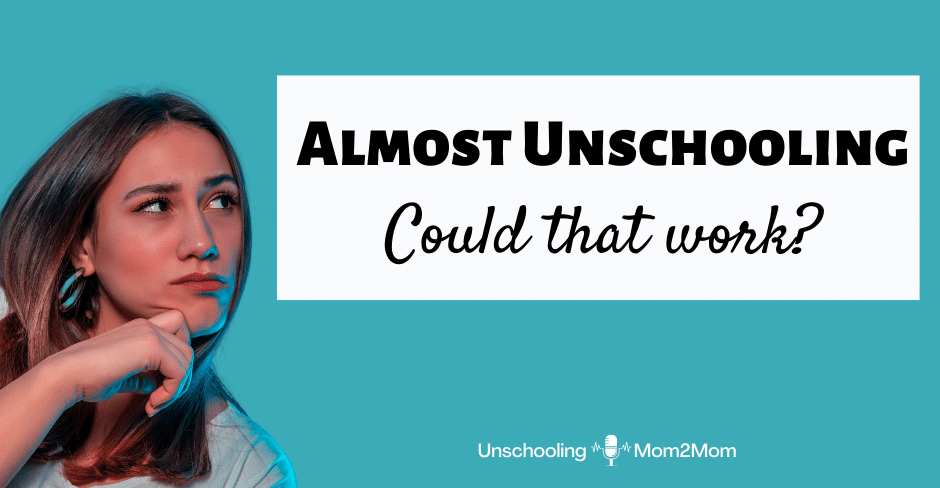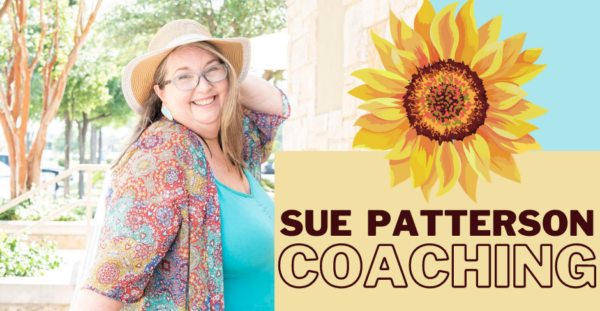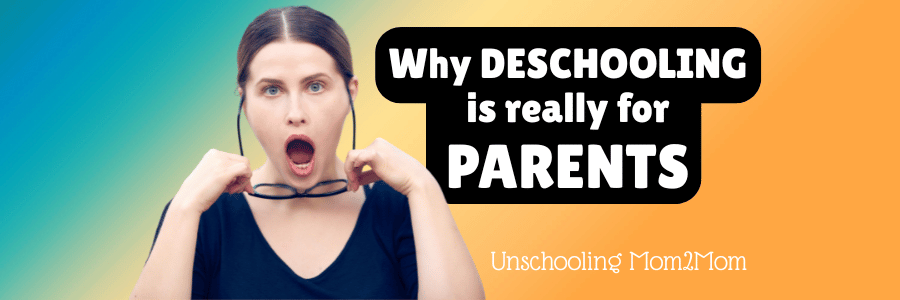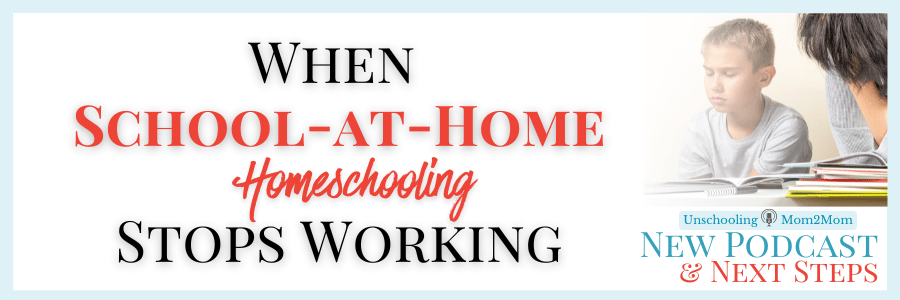Can you be "Almost Unschooling?"
What if you're not sure?
What if you're ALMOST Unschooling - would that work?
This past weekend, I spoke at a local conference about imagining education in different ways. I was the Unschooling Representative.
So most people there weren’t really unschoolers or even that interested in unschooling.
Of course, I talked to them anyway.
One of the most common responses from those who HAD heard of unschooling, but felt they wanted to do partial unschooling and partial traditional homeschooling approach. Maybe you can relate? I think a lot of people feel this way.
So I want to talk about this a little with you!
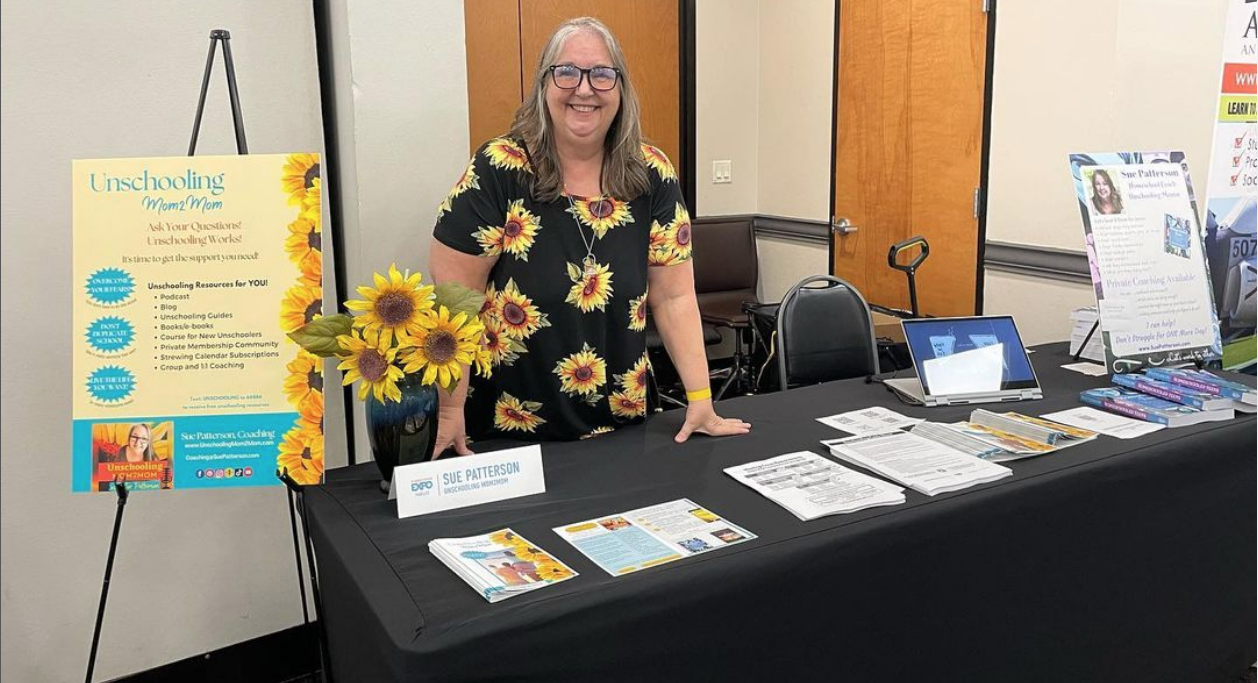
But first, if we’ve never met, I’m Sue Patterson, your host here at the Unschooling Mom2Mom podcast - and on all the social media platforms. I share information because I want you to know that Unschooling really does work - it did for my own 3 now grown kids, and it can for your kids too.
I have a variety of ways to help people (and I’ll list them in the show notes), but probably the fastest way to get the help you need is to hop on a phone call with me. Some people bring their questions to the call, get answers and resource links and they’re off and running. Others need more ongoing help - sometimes with me on calls throughout the month - kind of like an Unschooling personal trainer. Other times ongoing help comes through my coaching group. Whatever works best for you - and sometimes you need to talk to real humans about all this, right?
But let’s get back to this idea of partial unschooling. I know the purists in the community may disagree, but I believe that parents do best when they do what resonates with them. No one should do something because someone else said so. That may mean that some version of "Almost Unschooling," is kind of starting place. I don't think there’s anything wrong with that! It’s ok.
After coming out on the other side, with these grown kids of mine, I can tell you that I changed over the years. Everyone I know did.
How we started was not how we finished, so to speak.
Our Journey to Unschooling (the quick version)
So I started as a mom from the suburbs with no intention of homeschooling. We were t-ball and Tiger cubs people.
And then school stopped working for us. Or maybe we just woke up and opened our eyes.
After first grade, I thought,
“How hard can second grade be? They’ll always take us back if I flop at this!”
And I started searching for information. In my mind, I wanted learning to be creative and fun… but I was ONLY aware of typical school subjects. I thought I’d just sparkle them up and the kids would love it!
It was the 90s. And we didn’t have nearly the number of opportunities you have for FINDING good solid information. We collected ideas from catalogues and ordered things by mail. Before you knew it, I was swept away with all the marketing.
And you won’t believe what we started with: Calvert. Their tag line is “School in a box.” 😳
That was NOT at all what I had envisioned, but it seemed like the best option at the time. So we bought their stuff and started.
Maybe I’ll do another podcast with more details of our family’s path to unschooling, but I bring all this up to show you how people change. And just because you start on one path doesn’t mean you have to stay on it.
We started to let our Calvert curriculum fall by the wayside. Real life was filled with so many fun opportunities, we just kept choosing to do them instead of completing the curriculum.
The curriculum felt like we were reading about life, while Real Life was ringing the doorbell inviting us out to play!
All the time!
It helped to know other unschoolers and be able to pick their brains. The unschooling concept made sense. I knew I was in new territory - at least as far as I was concerned. New to me. NO ONE I knew homeschooled - let alone did this wacky unschooling thing. So I started reading and talking to people about how their kids learned and how they approached it. And as I was doing that, I was noticing my own kids.
When I didn’t push the curriculum, we had less power struggles. I kept thinking, “If they need this, we’ll pick it later down the road.” It was really clear that my kids had all different strengths and interests. One might have an interest in something typically taught in 7th grade - even though he was in third. It made no sense to make him wait for it. I actually went to a website and printed out every grade level’s expectations subject-wise.
The lists were nothing like what they look like over there now, but here's the link if it will help you:
World Book Encyclopedia Scope & Sequence
That’s how I saw that their strengths and weaknesses were all over the place when it came to grade levels.
And it helped me let that arbitrary scope and sequence fall by the wayside.
Over time, I stopped looking at it altogether.
You don’t have to fully embrace unschooling to implement some parts of it. And maybe, like me, as you embrace a little of the unschooling ideas, you’ll grow your own confidence in yourself and your kids. For many of us, it doesn’t come to us all in one fell swoop.
It’s ok to be an Eclectic Homeschooler - a little unschooling, a little traditional schooling.
But continue to unpack your ideas about all of it.
When you hear yourself coming from a place of fear - listen to it and see if it’s really rational.
Does it matter that your 8 year old doesn’t know his times tables? Not really.
Does listing off the elements of the Periodic Table really impact their life right now? Probably not.
If you’re making decisions because you feel a cultural pressure to be more like everyone else, I would love to talk with you more and help you get past that overwhelmed “I’m not doing enough” feeling.
Is Your Fear in Charge?
When I ask,
“Are you coming from a place of fear?”
- that may be confusing a little.
What it looks like, or how it shows up in your life is:
- Feeling like you’re not doing enough.
- Looking for affirmation from other people.
- Feeling stuck or overwhelmed
- Feeling like you’ll be in trouble (or your kids will be) if you do this wrong.
All of these feelings can pop up. And I think it’s because we’re really conditioned to conform - to please everyone else - even if that means sacrificing what we think could be best for us. Our fear prevents us from even looking at this more deeply to see what parts could work for us.
If the approach you’re using isn’t working that well, let’s look at more of the unschooling principles and see if you can incorporate some of them into you and your kids’ lives.
Keep learning about how unschooling works.
Unschooling isn't familiar, because most of us didn’t grow up this way. And we’ve had a lot of years conditioning us that our conformity will lead to success. It’s just that that isn’t always true. Familiar doesn’t mean it’s the only way.
I have three big points I want to leave you with. One about Individualization, two about making mistakes, and three about noticing your own bias.
1. Individualization
You’re creating a truly individualized adventure for your family. That’s not lipservice to the word Individualized. Because TRULY individualizing is doing what works for that individual. Without concern about what everyone else is doing. On one hand, we love that term. On the practical side, it scares us to death, right?
One of the best ways to deal with this is to stay flexible and curious.
Could some part of what you’re thinking be “off” a little?
Could you look a little more at “Why?” or “Why not?” when it comes to the decisions being made?
Your family doesn’t have to look anything like mine - or your sister’s or your neighbor down the street. The personalities that are in your home are not in theirs. Your own priorities may not be the same either. We had so many years of being told there was one right answer - one right path to parenting or educating correctly - but there are MANY right paths.
Many of us have stories in our heads about what a good mom or dad is supposed to be doing. And we may need to unpack that a little more too. Have you noticed when times get hard, you sometimes revert back to the familiar - even those things you Did NOT want to repeat when you became a parent. But we get tired or frustrated, and suddenly we hear our own mom’s words shooting out of our mouths. This can change though. You can learn more and create new habits. It will take a little action on your part though… you can’t just passively ride the conveyor belt year after year.
2. Mistakes Are Ok
It’s ok to learn them through trial and error. Don’t be afraid of making mistakes. There’s no teacher wandering around ready to scream at you “You’re doing it all wrong.” You’re experimenting. Making choices that make sense for you and YOUR kids.
Think of it as living in an experiment. Try the things you’d like to try, gather the data about what worked and what didn’t. And then make the adjustments needed.
Keep learning.
Schools convinced us that when we graduated, we were done learning. But that’s not true at all. The world changes and we need to know what to do. New information comes out and we need to avail ourselves to it. And really, we’re doing it all the time. We all learned how to figure out how to do Zoom calls in the last couple of years. We learn more about hobbies that interest us by exploring on the internet, using Google or Youtube.
3. Notice Your Bias
And you’re noticing your own biases. Sometimes we have a hard time seeing them. We don’t even KNOW that some arbitrary bias we’ve adopted as true - is not true at all. That’s why I emphasize staying flexible. What you think “all kids need to be able to… do a particular thing or have a particular skill by a certain age” may change over time.
Similarities with Attachment Parenting
If you liked attachment parenting when your kids were little, unschooling has a lot of principles that are aligned with that - only for big kids. Unschoolers don’t believe that attachment approach has to stop at age 5.
Your own parenting journey - what we know to be true - will change over time.
Little bits will become apparent to you and where you start will probably will not be where you finish. For those of us who’ve been parenting a little while, how many times did we say,
“When I have kids, they’ll never...do this or that!”
Only to have them do EXACTLY that - or worse!
Our ideas change when we are in the thick of it! And we can’t always even KNOW what the future holds.
So it stands to reason that we may need more tools to figure out how to parent in a more connected way and how to truly individualize this educational approach with our kids. Most of us didn’t develop a habit of learning more about how to be the parent we want to be. We may duplicate what we saw growing up - our parenting and our schooling - making little changes here and there.
It's a Process, a Journey...
These ideas can be incorporated into your lives even if you do a little math curriculum. Or you signing them up for co-op classes.
It doesn’t have to be all or nothing.
It’s about staying open to the idea that maybe you don’t know all that you’ll need yet - so staying flexible is key.
Staying curious YOURSELF about how to individualize and parent the way you want to parent will help you too.
I’ll keep talking to you about the benefits of unschooling - but it’s fine if you’re not there yet. It’s fine if you never get there.
I want to help you see that you can have a life filled with joy and adventure - and more connection with your kids.
It’s a journey. And I’m happy to walk alongside with you for some of it.
Take care and we’ll talk again next week.

